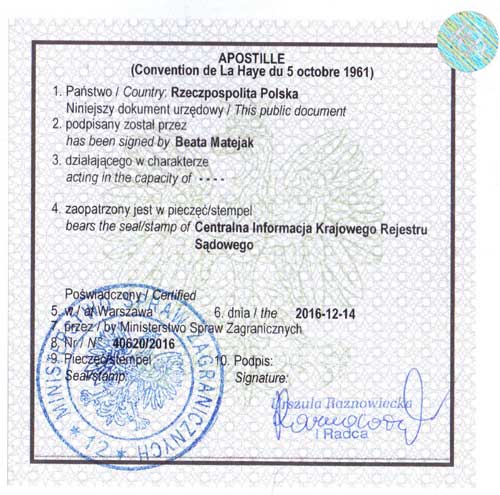
Schmidt & Schmidt covers the full spectrum of legalization services for documents issued in Poland.
Poland joined the Hague Convention on the Simplified Authentication of Documents on 19 November 2004; the Convention entered into force on 14 August 2005.
The apostille, or the “Hague apostille” is a certificate that authenticates the origin of a public document (e.g., a birth, marriage or death certificate, a judgment, an extract of a register or a notarial attestation). It confirms the authenticity of the signature and the authority of an official who signed the public document.
Documents issued in Poland and certified with an apostille in accordance with the Hague Convention of 1961 of 1961 are recognised in all Member States of the Hague Convention and do not require any other form of certification, such as consular legalization, which considerably reduces the costs and time required for the certification of documents. So far, more than 120 states have joined the Convention.
The apostille is not sufficient for use in the states that are not party to the Hague Convention. In this case, consular legalization applies to a public document.
Designated Competent Apostille Authorities in Poland
There exist a few designated competent authorities from where you can obtain an apostille for your official documents. Some of them include:
- Ministry of Foreign Affairs (Ministerstwo Spraw Zagranicznych): key authority competent to issue apostilles in Poland. It handles a wide range of documents, ensuring their authenticity and validity for international use.
- National Agency for Academic Exchange (Narodowa Agencja Wymiany Akademickiej; NAWA): mainly responsible for apostilling academic qualifications like certificates of graduation, doctoral and postdoctoral diplomas, as well as their duplicates and copies.
- Ministry of Culture and National Heritage (Ministerstwo Kultury i Dziedzictwa Narodowego): its Department of Art Education is authorized to apostille documents issued by art schools. This includes certificates, diplomas, course records, and authentications issued by art schools, intended for legal transactions with foreign countries.
- The Ministry of Education and Science (Ministerstwo Edukacji i Nauki): another authority to issue apostilles for educational documents. It covers certificates issued by schools and vocational schools in Poland, as specified in Article 8(5)(2)(c) of the Education Act of 14 December 2016.
- School Superintendents (Kuratorium Oświaty): this organization deals with apostilling documents related to primary and secondary education, as well as continuing education facilities, and practical education facilities intended for legal transactions with foreign countries.
- Directors of Regional Exam Commissions (Okręgowa Komisja Egzaminacyjna): have the authority to apostille certain documents associated with education.
The apostille in Poland is a square stamp in Polish with the obligatory heading "Apostille" and a reference to the 1961 Hague Convention in French (Convention de La Haye du 5 octobre 1961). The apostille certificate’s sides will be at least 9 centimeters long.
Types of documents

| Can be apostillized | Cannot be apostillized |
|---|---|
|
|
Specific aspects and document requirements for the apostille in Poland
Poland is among the 120 countries that recognize and issue apostilles in accordance with the Hague Convention of 5 October 1961. The apostille serves as a confirmation of the official status of a document.
Document Requirements for Apostille in Poland
To obtain an apostille for a document in Poland, the following requirements generally apply:
- The document must be an original or a certified copy issued by the competent authority.
- The document should contain all relevant and accurate information.
- The document must be in the official language of the issuing country or translated into the official language of the country where the apostille is sought.
- The apostille must be affixed by the designated competent authority in accordance with regulations.
The apostille is issued in a uniform format. In Poland, it has the form of a printed sticker with a handwritten signature of an official, an official seal, and a hologram.
Legalization of Polish educational documents for use abroad
In order for educational documents issued in Poland, such as school reports, university degree certificates, transcripts of records, enrollment certificates, and other certificates from schools or universities, to be valid and recognized abroad, they must undergo a process of certification through legalization or apostille. The certification process is carried out by the Ministry of Foreign Affairs in Poland.
The required documents will vary based on a specific case, but will in general include either originals or notarized copies with an apostille original of the certificate, or for all non-member countries - a legalized original of the certificate or its notarized copy.
Certificates may be legalized or receive an apostille by:
- The consul of the Republic of Poland having jurisdiction with respect to the required territory;
- The educational authorities of the state in the territory;
- A diplomatic representation or consular office accredited in the Republic of Poland or any EU, OECD, or EEA member state: where the certificate was issued, they can also provide legalization or apostille services. This applies specifically to certificates or documents that grant eligibility for admission to higher education programs in the relevant countries.
Legalization involves submitting the original document to the Ministry, verifying and affording it with a printed sticker. The specific requirements depend on the regulations of the destination country. It is advisable to consult the relevant authorities or seek professional help from competent organizations.
Recognition of the authenticity of public documents within the EU
Multilingual documents (under CIEC Convention)
Contracting states of the Vienna CIEC Convention of 08.09.1976 (issuance of multilingual extracts from civil status registers: birth, marriage, and death certificate) are:
- Austria, Belgium, Bosnia-Herzegovina, Bulgaria, Germany, Estonia, France, Italy, Cape Verde, Croatia, Lithuania, Luxembourg, Macedonia, Moldova, Montenegro, Netherlands, Poland, Portugal, Romania, Switzerland, Serbia, Slovenia, Spain, and Turkey.
Regulation on public documents (EU) 2016/1191 of 6 July 2016
Regulation (EU) 2016/1191 of 6 July 2016 on public documents simplifies the circulation of certain public documents that must be presented in an EU Member State and have been issued in another EU Member State, thus exempting public documents from the confirmation of authenticity with the Apostille with the aim of reducing administrative burden and costs for citizens.
Often, especially for countries outside of the agreement, a document may require additional verification to recognize its authenticity.
Documents that may be subject to this are:
- Notarial acts and court documents: should be authenticated by the president of the competent regional court (sąd okręgowy), documents issued by courts of appeal - by the president of the competent court of appeal (sąd apelacyjny);
- Certificates, diplomas, higher education institutions: should be authenticated by the National Agency for Academic Exchange (Narodowa Agencja Wymiany Akademickiej);
- Certificates, diplomas, authentications issued by art schools: should be authenticated by the Ministry of Culture and National Heritage (Ministerstwo Kultury i Dziedzictwa Narodowego);
- Master craftsman’s certificates and craftsman’s certificates: should be authenticated by the Polish Crafts Association in Warsaw (Związek Rzemiosła Polskiego);
- Documents of consulting points and schools abroad established by the Minister of Education and Science: should be authenticated by the Ministry of Education and Science (Ministerstwo Edukacji i Nauki);
- Documents concerning medical qualifications (national medical exam certificates, certificates issued by medical chambers): should be authenticated by the Ministry of Health (Ministerstwo Zdrowia);
- Copies from the National Court Register: should be authenticated by the entitled official of the General Information of the Court Register (Centralna Informacja Krajowego Rejestru Sądowego);
- Commercial documents: should be authenticated by the Polish Chamber of Commerce in Warsaw (Krajowa Izba Gospodarcza) and by regional chambers of commerce.
Consular legalization of Polish documents for use abroad
Consular legalization is the process of authenticating or certifying a legal document so a foreign country's legal system will recognize it as with full legal effect that is carried out by the diplomatic or consular mission of the country in which the document is to be used.
In cases where apostilles are not recognized, holders of foreign documents will need to legalize them instead. However, If the country of destination of the document recognizes and issues apostilles, then legalization is unnecessary.
The process of legalization usually involves a few additional steps compared to obtaining an apostille. Such may include:
- Authentication by the competent authority in the country of origin: this typically involves verifying the signature and seal/stamp on the document.
- Additional translations and certifications: documents may need to be translated into another language. It will need to be certified by a qualified translator or notary public.
- Consular legalization: the consulate or embassy will verify the authenticity of the document and attach their own certification or stamp.
This procedure is required when the destination country does not recognize or accept the apostille certification. One needs to submit the original document, along with any required copies or supporting materials, to the respective consular office. The consular officials will review the document, verify its authenticity, and affix their seal or stamp to certify its validity.
The consular legalization process may require additional steps like obtaining translations of the document into the language of the destination country or providing additional supporting documentation as requested by the consular office.
It is up to the diplomatic mission to decide about the authentication procedure.
The specific requirements and procedures for consular legalization may vary depending on the regulations of the destination country.
The main differences between an apostille and consular legalization of documents
The common feature between apostille and consular legalization is that they authenticate an official document for presentation to institutions in another country. However, they have many differences.
| Apostille | Consular legalization | |
|---|---|---|
| Legal effect | Can be used in all countries that are party to the Hague Convention on the Simplified Legalization of Documents. | Use between States one or both of which is not a member of the Hague Convention, or where one of the contracting States has protested the accession of the other. |
| Difficulty | Moderate. To obtain an apostille, contact the competent apostille authority of the state of origin of the document. | High. For consular legalization, various inland authorities and a diplomatic mission of the state of destination must be involved. |
| Pre-certification | Usually not required. | Is obligatory. |
| Attestation at the state of destination embassy in the state of origin of the document | No need to contact the Consulate of the country of destination. | Is the final step of legalization. |
Apostille and consular legalization in all cities of Poland
Schmidt & Schmidt provides apostille and consular legalization services for public documents originating from all regions across Poland. We handle the entire process, from document review to obtaining the necessary certifications, ensuring that your documents are valid and recognized internationally. With our reliable services, you can confidently use your Polish public documents abroad.
Procurement of documents from Poland
If the important documents are lost or damaged, or current copies of the documents are needed, the re-issue of the documents is required. It is not unusual for people outside Poland to encounter difficulties with obtaining new documents when abroad. Our consultants will help you procure new documents from Poland remotely, and we can arrange for your documents to be sent by courier anywhere in the world.
Certified translation of documents from Poland
Copies and transcripts of civil status documents can be translated into any language by a sworn translator in Poland or the translation can be done in the country of destination. We offer certified translations of civil status documents with further certification. The cost of the work is calculated according to the volume of the document in question.
Does the translation have to be apostillized?
Any foreign document issued in one country and used in another country must be legalized for use abroad. Therefore, the authenticity of a certified translation from Poland needs to be certified by an apostille. Consequently, many authorities may not accept certified translations from Poland if the translation has not been properly authenticated in Poland for use abroad. To avoid this confusion, translations should better be made in the state of the destination of the document.











































